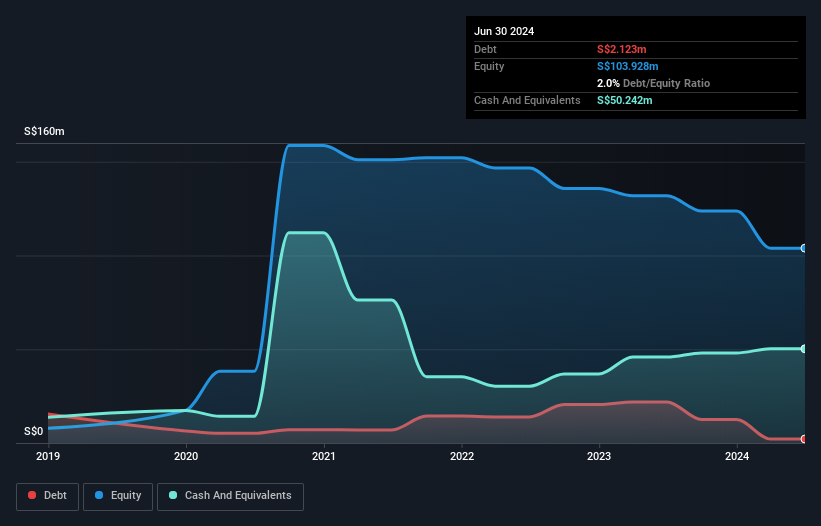- Singapore
- /
- Entertainment
- /
- SGX:XJB
Does G.H.Y Culture & Media Holding (SGX:XJB) Have A Healthy Balance Sheet?

David Iben put it well when he said, 'Volatility is not a risk we care about. What we care about is avoiding the permanent loss of capital.' It's only natural to consider a company's balance sheet when you examine how risky it is, since debt is often involved when a business collapses. As with many other companies G.H.Y Culture & Media Holding Co., Limited (SGX:XJB) makes use of debt. But should shareholders be worried about its use of debt?
When Is Debt A Problem?
Generally speaking, debt only becomes a real problem when a company can't easily pay it off, either by raising capital or with its own cash flow. Ultimately, if the company can't fulfill its legal obligations to repay debt, shareholders could walk away with nothing. However, a more usual (but still expensive) situation is where a company must dilute shareholders at a cheap share price simply to get debt under control. By replacing dilution, though, debt can be an extremely good tool for businesses that need capital to invest in growth at high rates of return. When we think about a company's use of debt, we first look at cash and debt together.
View our latest analysis for G.H.Y Culture & Media Holding
What Is G.H.Y Culture & Media Holding's Net Debt?
You can click the graphic below for the historical numbers, but it shows that G.H.Y Culture & Media Holding had S$2.12m of debt in June 2024, down from S$21.9m, one year before. But on the other hand it also has S$50.2m in cash, leading to a S$48.1m net cash position.

How Strong Is G.H.Y Culture & Media Holding's Balance Sheet?
Zooming in on the latest balance sheet data, we can see that G.H.Y Culture & Media Holding had liabilities of S$46.5m due within 12 months and liabilities of S$1.60m due beyond that. Offsetting this, it had S$50.2m in cash and S$15.0m in receivables that were due within 12 months. So it can boast S$17.2m more liquid assets than total liabilities.
This short term liquidity is a sign that G.H.Y Culture & Media Holding could probably pay off its debt with ease, as its balance sheet is far from stretched. Simply put, the fact that G.H.Y Culture & Media Holding has more cash than debt is arguably a good indication that it can manage its debt safely. When analysing debt levels, the balance sheet is the obvious place to start. But you can't view debt in total isolation; since G.H.Y Culture & Media Holding will need earnings to service that debt. So if you're keen to discover more about its earnings, it might be worth checking out this graph of its long term earnings trend.
In the last year G.H.Y Culture & Media Holding wasn't profitable at an EBIT level, but managed to grow its revenue by 18%, to S$68m. That rate of growth is a bit slow for our taste, but it takes all types to make a world.
So How Risky Is G.H.Y Culture & Media Holding?
While G.H.Y Culture & Media Holding lost money on an earnings before interest and tax (EBIT) level, it actually generated positive free cash flow S$13m. So although it is loss-making, it doesn't seem to have too much near-term balance sheet risk, keeping in mind the net cash. With mediocre revenue growth in the last year, we're don't find the investment opportunity particularly compelling. The balance sheet is clearly the area to focus on when you are analysing debt. However, not all investment risk resides within the balance sheet - far from it. These risks can be hard to spot. Every company has them, and we've spotted 2 warning signs for G.H.Y Culture & Media Holding you should know about.
Of course, if you're the type of investor who prefers buying stocks without the burden of debt, then don't hesitate to discover our exclusive list of net cash growth stocks, today.
New: Manage All Your Stock Portfolios in One Place
We've created the ultimate portfolio companion for stock investors, and it's free.
• Connect an unlimited number of Portfolios and see your total in one currency
• Be alerted to new Warning Signs or Risks via email or mobile
• Track the Fair Value of your stocks
Have feedback on this article? Concerned about the content? Get in touch with us directly. Alternatively, email editorial-team (at) simplywallst.com.
This article by Simply Wall St is general in nature. We provide commentary based on historical data and analyst forecasts only using an unbiased methodology and our articles are not intended to be financial advice. It does not constitute a recommendation to buy or sell any stock, and does not take account of your objectives, or your financial situation. We aim to bring you long-term focused analysis driven by fundamental data. Note that our analysis may not factor in the latest price-sensitive company announcements or qualitative material. Simply Wall St has no position in any stocks mentioned.
About SGX:XJB
G.H.Y Culture & Media Holding
An investment holding company, engages in the production and promotion of dramas and films and presentation of live entertainment in Singapore, China, Japan, and Australia.
Adequate balance sheet and overvalued.
Similar Companies
Market Insights
Community Narratives




